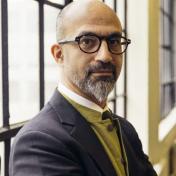John E. Fernández
John E. Fernández, class of 1985, has been on the faculty of MIT since 1999. He is a full Professor and Director of the Building Technology Program in the Department of Architecture and is Director of the Urban Metabolism Group, a highly multidisciplinary research group focused on the resource intensity of cities and design and technology pathways for future urbanization. He is also co-Director of the International Design Center at MIT, a large internationally funded center for design studies across engineering and architecture.
He is author of two books, numerous articles in scientific and design journals including Science, the Journal of Industrial Ecology, Building and Environment, Energy Policy and others, author of nine book chapters and a frequently invited speaker at conferences and symposia worldwide. He has organized, chaired or co-chaired 7 international conferences. He is Chair of Sustainable Urban Systems for the International Society of Industrial Ecology and Associate Editor of the journal Sustainable Cities and Society.
The MIT Urban Metabolism Group, founded by Fernández in 2008 has been at the forefront of establishing an understanding of the resource intensity of urbanization. Research has included material flow analysis of a number of cities in North and South America, Europe, and Asia. Recent projects include an examination of the Chinese building sector to identify sustainable transition pathways for provinces and cities, a system dynamics model for the Singapore water system, an alternative urban technology development scenario for Lagos, Nigeria, and the development of a global typology of urban resource consumption based on a comprehensive analysis of urban resource intensity data. The Global Typology of Urban Resource Consumption has influenced urban thinking and policy development at international agencies, partner universities, and academic centers and spawned several new initiatives examining the implications for technology development for specific city types.
This past June the Urban Metabolism Group officially inaugurated the creation of the African Urban Metabolism Network, a research and implementation network of academic, government, non-governmental, business, and international agency partners motivated by the prospect for a sustainable and humane urban African future. The inaugural workshop held in Cape Town brought together dozens of key players working on deployment of decarbonized energy, water, food, transportation and waste systems in African cities across the continent. During the past 18 months the Urban Metabolism Group has engaged a full time research scientist, 5 graduate student researchers, and 50 UROPs.
Previous to establishing the Urban Metabolism Group Fernández was primarily engaged in the research of materials for high performance buildings. He collaborated with Royal Society Research Professor Mike Ashby of the University of Cambridge, UK and Granta Design on the development and launch of the first materials selector for sustainable building design.
Fernández has served on several National Science Foundation Review Panels, as a member of the Department of Energy Roadmap 2020 Advisory Committee, and as a member of the Board of Directors of the Building Envelope Technology and Environmental Council of the National Institute of Building Science. He also served as a member of the Research Committee of the United States Green Building Council leading to the publication of A National Green Building Research Agenda in 2007. He is a Life Member of Clare Hall, University of Cambridge having been a Visiting Research Fellow in 2003. He was MIT Class of 1957 Career Development Professor from 2002 to 2005 and previously served as the Director of Research for Sustainable Energy Systems of the MIT Portugal Program.
Fernández is currently a Board member of New Ecology, Inc. in Boston, and a member of the Board of Advisors for the Center for Sustainable Energy of the Fraunhofer Institute, also in Boston. Fernández has participated in the launch of two startup companies in the past 5 years. Fernández has also served many years on a number of MIT committees including the Committee on Undergraduate Admissions and Financial Aid, the Committee on the Undergraduate Program, the ROTC Oversight committee, and currently the Committee on the Innovation Initiative, the Faculty Policy Committee, and the Institute Planning Committee. He has also served on various special groups and task force including the subcommittee on the Implementation of the Recommendations of the Task Force on the Undergraduate Educational Commons, the Working Group on the Future of Teaching and Learning Spaces at MIT, the School of Architecture and Planning Dean’s Diversity Committee, the Dean’s Energy and Environment Council, and currently, the Campus Sustainability Task Force, the MIT Materials and Waste Management Working Group, and the Metropolitan Warehouse Advisory Group.
A practicing architect with his partner and wife, Malvina Lampietti, Fernández has been designer of more than 2.5 million square feet of new construction since completing graduate work at the School of Architecture at Princeton University. As senior designer in two major New York City architecture firms Fernández led the design and construction of major commercial, institutional, and residential buildings in Washington D.C., New York City, Philadelphia, Los Angeles, Honolulu, Jakarta, Tokyo, Shanghai, and other locations. Recent work with Lampietti includes the design and construction of 5 low energy residences in the Upper Hudson Valley. Since September 2015, Prof. Fernández lives in the Housemaster’s apartment at Baker House on the MIT campus with his wife Malvina Lampietti and son Lorenzo, a senior at Concord Academy. Their daughter Vita is a junior at Johns Hopkins University majoring in cognitive science. As a young classical pianist Fernandez won several competitions and attended the Interlochen Arts Academy before deciding to pursue science, engineering, and eventually architecture. As a snowboarder he tries to keep up with Lorenzo and Vita as they discover new slopes here and abroad.



